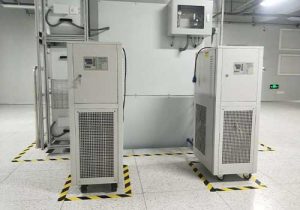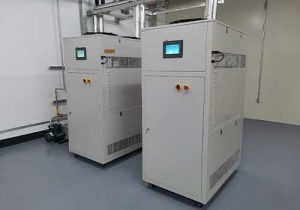small chiller system
Small Chiller System: Efficient Cooling for Limited Spaces
Small chiller systems are increasingly becoming the go-to solution for cooling needs in spaces where traditional chiller systems are not feasible due to size constraints or where precise temperature control is required. These systems are designed to provide efficient cooling in a compact form factor, making them ideal for a variety of applications across different industries.

Principles of Operation
Small chiller systems operate on the same fundamental principles as larger chiller systems but are adapted to operate on a smaller scale. They utilize a refrigeration cycle that involves a compressor, condenser, evaporator, and expansion valve to transfer heat from a desired location to the external environment. The key to their operation is the precise control of the refrigerant flow, which allows for accurate temperature regulation.
Types of Small Chiller Systems
There are several types of small chiller systems, each suited for specific applications:
Portable Chillers: These are designed for temporary or mobile cooling needs and can be easily moved from one location to another.
Mini Chillers: These compact chillers are designed for small spaces such as laboratories, small offices, or compact equipment rooms.

Water-Cooled Chillers: Despite their size, these chillers use water as a coolant and are suitable for applications where water is available and space is limited.
Air-Cooled Chillers: These units do not require water for cooling and are ideal for environments where water supply is a concern.
Components of a Small Chiller System
The main components of a small chiller system include:
Compressor: This is the heart of the system, responsible for circulating the refrigerant.
Condenser: This component cools the refrigerant by dissipating heat to the environment, either through air or water.
Evaporator: Here, the refrigerant absorbs heat from the area that needs cooling.
Expansion Valve: This controls the flow of refrigerant and ensures proper temperature and pressure within the system.
Control System: Modern small chiller systems often feature advanced control systems for precise temperature regulation.
Benefits of Small Chiller Systems
The use of small chiller systems offers several advantages:
Space Efficiency: Their compact design allows for installation in areas with limited space.

Energy Efficiency: Many small chiller systems are designed with energy efficiency in mind, reducing operational costs.
Precision Temperature Control: They are ideal for applications that require strict temperature control, such as in laboratories or medical facilities.
Flexibility: Portable models offer the flexibility to move the cooling unit as needed, making them suitable for temporary or changing cooling needs.
Market Trends in Small Chiller Systems
The market for small chiller systems is driven by the need for efficient temperature control in a variety of applications. As technology advances, these systems are becoming more energy-efficient and versatile. Manufacturers are developing chillers that use low Global Warming Potential (GWP) refrigerants, such as HFOs or natural refrigerants like CO2, to reduce environmental impact.
In conclusion, small chiller systems are indispensable tools for precise temperature control in limited spaces. Their compact design, energy efficiency, and versatility make them suitable for a wide range of applications. As the market continues to evolve, expect to see even more innovative solutions that cater to the specific needs of various industries.
Related recommendations
Reasons why Industrial Chillers need to be Debugged
1443Reasons why Industrial Chillers need to be Debugged Industrial chiller is a kind of water cooling equipment that can provide constant temperature, constant pressure and constant flow. The pri...
View detailschiller cool
823Chiller Cool: Definition and Working Principle A chiller cool system, or simply a chiller, is a mechanical refrigeration system that provides cooling for various applications. Chillers work on ...
View detailsMain Parameters for the Operation of Chiller Refrigeration System
1404Main Parameters for the Operation of Chiller Refrigeration System The operating parameters of industrial chillers have a great impact on the economy and safety of their work. In the refrigera...
View detailssplit chiller
404Split Chillers: Definition, Types, Efficiency, Market Trends, and Technical Specifications Definition of Split Chillers A split chiller is a versatile air conditioning system designed to pro...
View details
 LNEYA Chiller
LNEYA Chiller






HelloPlease log in